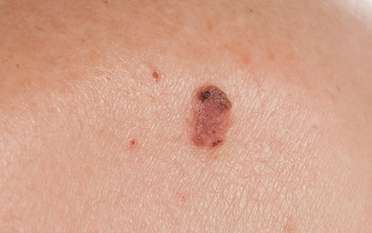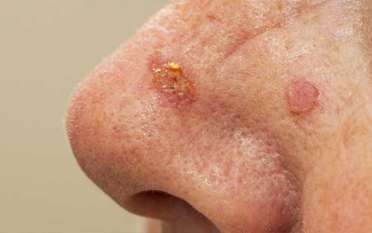Skin Cancer
What is skin cancer?
Skin cancer is the most common type of cancer worldwide, affecting millions of people each year. Primarily caused by exposure to harmful ultraviolet (UV) rays from the sun or tanning beds, skin cancer can also be influenced by genetics and weakened immune systems.
There are three main types of skin cancer:
- Basal cell carcinoma (BCC) and squamous cell carcinoma (SCC) are the most common. These often appear as abnormal growths or sores on sun-exposed areas like the face, neck, and hands. While they rarely spread, early detection and treatment are essential.
- Melanoma is less common but more serious.
Understanding skin cancer is crucial for early detection and prevention.
Basal cell carcinoma (BCC) is the most common type of skin cancer. It typically appears as a pinkish or pearly bump, often with a rolled edge. BCC rarely spreads to other parts of the body but can cause local tissue damage if left untreated. Regular skin examinations and early intervention are essential for managing BCC.

Squamous cell carcinoma (SCC) is the second most common type of skin cancer. It often manifests as a red, scaly patch or a rapidly growing, firm bump. SCC has the potential to spread to nearby tissues and lymph nodes. Early diagnosis, treatment, and sun protection are crucial in managing SCC and preventing its progression.

Melanoma: Melanoma is the most serious form of skin cancer, arising from pigment-producing cells called melanocytes. Unlike basal cell carcinoma and squamous cell carcinoma, melanoma can spread to other parts of the body if not detected early. It often appears as an irregularly shaped mole with uneven colors and borders. While it can develop anywhere, it’s commonly found on sun-exposed areas.

Hear from Our Patients:
 Villy ToonMarch 29, 2024.The doc was fast, knowledgeable and took great care of the patient.
Villy ToonMarch 29, 2024.The doc was fast, knowledgeable and took great care of the patient. Michael QueyrouzeMarch 26, 2024.Great staff and docs!!!
Michael QueyrouzeMarch 26, 2024.Great staff and docs!!! Nancy ErdmannMarch 25, 2024.Highly recommend! Staff was very helpful and friendly! Hardly any wait time before seeing the doctor! Dr. And his nurse had me in and out after a procedure! Would definitely come back if needed! Even driving from Moses lake! I was seen at the Burien location.
Nancy ErdmannMarch 25, 2024.Highly recommend! Staff was very helpful and friendly! Hardly any wait time before seeing the doctor! Dr. And his nurse had me in and out after a procedure! Would definitely come back if needed! Even driving from Moses lake! I was seen at the Burien location. Misael RiveraMarch 23, 2024.Fast, Professional, reliable and Excellent Services
Misael RiveraMarch 23, 2024.Fast, Professional, reliable and Excellent Services George SamraMarch 22, 2024.Very kind and caring staff. The doctors were very professional and bed side manners were great. Took very good care of my pain tolerance during my surgical procedure. I was very satisfied with the whole process.
George SamraMarch 22, 2024.Very kind and caring staff. The doctors were very professional and bed side manners were great. Took very good care of my pain tolerance during my surgical procedure. I was very satisfied with the whole process. Maela MooreFebruary 4, 2024.Gina Mower is knowledgeable, friendly and efficient. She has a special talent for putting people at ease. I also like this facility a lot. It is clean and spacious with beautiful art throughout.
Maela MooreFebruary 4, 2024.Gina Mower is knowledgeable, friendly and efficient. She has a special talent for putting people at ease. I also like this facility a lot. It is clean and spacious with beautiful art throughout. Scott AllenFebruary 4, 2024.Had a great experience here. It was easy to get an appointment and I was seen right away. Would recommend highly.Google rating score: 4.1 of 5, based on 196 reviews
Scott AllenFebruary 4, 2024.Had a great experience here. It was easy to get an appointment and I was seen right away. Would recommend highly.Google rating score: 4.1 of 5, based on 196 reviews

Get in Touch Now
Have questions or need assistance? Make sure to use our contact form for all inquiries.

